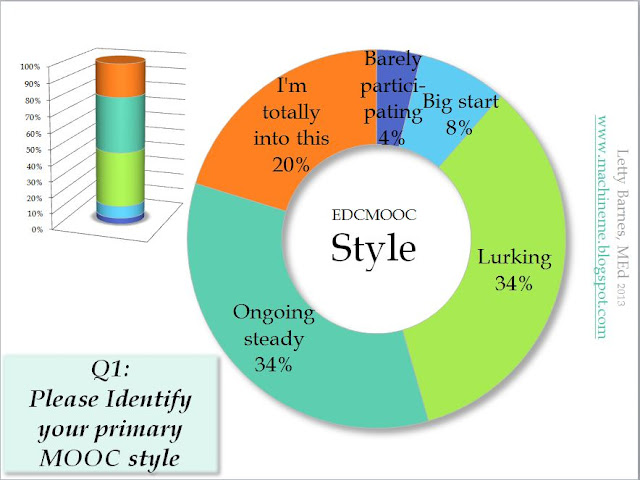This is a Collection
The nature of my interactions with the EDC MOOC have been
non-linear, distracting, disjointed, and chaotic.
The term 'infowhelm' was a feeling reported frequently by EDCMOOC participants in the social media postings. Our experience of wanting to take in all that was being offered in the way of collaborations and information was likened to trying to drink from a fire hose. I'm mostly guilty as charged by Nicholas Carr's Atlantic article titled Is Google Making us Stupid? "...people’s minds [have] become attuned to the crazy quilt of Internet media..." Based on self-observation, I can see that the way our minds have become attuned is not all good. Carr quotes playwright Richard Foreman, ...Foreman concluded, we risk turning into “‘pancake people’—spread wide and thin as we connect with that vast network of information accessed by the mere touch of a button.”. My reaction to that is, "pass the syrup!".
However I've loved every minute of it! By participating in this expedition in learning, I've been allowed to focus on and explore quite a number of topics that I would not have otherwise done. Technological determinism (by the way, I realized I'm not a TD), the nature of what is human, current thinking on utopian and dystopian futures, and so much more.
Just as my journey has been chaotic and disjointed, so too is my digital artifact. I’m declaring - that's okay. Whereas I might have produced one stunning piece of digital genius, as many of my course mates have done, I didn’t – no genius, and no singularity. Instead, I offer several related bits of digital creation courtesy of moi. The first of course is this blog which I created and posted to for the sole purpose of this course. I offer, not so much erudite and educationally referenced information, more a sort of opinion board about some things we’ve been studying.
Offering
The term 'infowhelm' was a feeling reported frequently by EDCMOOC participants in the social media postings. Our experience of wanting to take in all that was being offered in the way of collaborations and information was likened to trying to drink from a fire hose. I'm mostly guilty as charged by Nicholas Carr's Atlantic article titled Is Google Making us Stupid? "...people’s minds [have] become attuned to the crazy quilt of Internet media..." Based on self-observation, I can see that the way our minds have become attuned is not all good. Carr quotes playwright Richard Foreman, ...Foreman concluded, we risk turning into “‘pancake people’—spread wide and thin as we connect with that vast network of information accessed by the mere touch of a button.”. My reaction to that is, "pass the syrup!".
However I've loved every minute of it! By participating in this expedition in learning, I've been allowed to focus on and explore quite a number of topics that I would not have otherwise done. Technological determinism (by the way, I realized I'm not a TD), the nature of what is human, current thinking on utopian and dystopian futures, and so much more.
Just as my journey has been chaotic and disjointed, so too is my digital artifact. I’m declaring - that's okay. Whereas I might have produced one stunning piece of digital genius, as many of my course mates have done, I didn’t – no genius, and no singularity. Instead, I offer several related bits of digital creation courtesy of moi. The first of course is this blog which I created and posted to for the sole purpose of this course. I offer, not so much erudite and educationally referenced information, more a sort of opinion board about some things we’ve been studying.
Offering
Another offering here is my humorous take on the issues
surrounding transhumanism.
Styles and Roles
During a lot of the course I thought about the role I was
playing in this EDMOOC, and how others’ styles and roles were influential to me. So I did a survey using a Google form shown
here. Please note that one respondent chose to add an additional category onto the form in each question, and then select those. I have omitted that from my analysis (I put them in the categories I felt they fit most closely).
Analysis
Notebook
Finally, my notebook for much of my readings, links, and
thoughts may be found here: It is a
Microsoft OneNote file that contains many great ideas, links, references, and
other writings, inspired by this course that did not end up in my blog.
I'm also posting it as a pdf here





